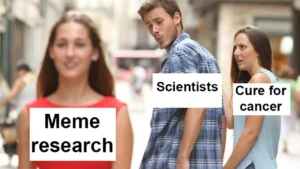Have you ever stumbled upon an amusing image paired with clever wording on the web and felt the urge to share it with your buddies? If so, you’re already quite familiar with the world of Internet memes. These aren’t just jesting illustrations or witty captions; they’re much more than that. They represent an enduring Internet trend that shows no sign of fading away. In this post, we’re diving deep into the captivating universe of memes, tracking their evolution and understanding their unflagging presence on the digital scene.

The term ‘memes’ refers to images, video clips, or blocks of text that have been tweaked creatively, often in a comical manner, reflecting variegated cultural facets of our society. They’re usually crafted, adapted, and disseminated across multiple social media channels. They serve as a tongue-in-cheek commentary on everything from politics and entertainment to the mundaneness of everyday life. More often than not, these engaging capsules of humor catch fire online within a few short minutes of appearing.
Where do memes come from?
Let’s turn back the clock to 1976, where it all started – This is the year when biologist Richard Dawkins invented the term “meme” in his book, “The Selfish Gene.” He explained memes as cultural units that spread from one individual to another, analogously to genes. He thought of memes as a sort of cultural evolution. Fast forward to the 1990s, the birth of memes took the Internet by storm as users across the globe shared these comedic nuggets on different platforms, be it forums or message boards.
With the passage of time, memes have evolved into an inseparable part of the online world and culture. They create a sense of unity among users by providing shared humor, concepts, and interests – a sense of virtual community, if you will. Plus, they serve as a creative outlet for individuals to display their wit, emotional intellect, and personal expression.
The progression and purpose of memes
Memes, in their captivating nature, demonstrate an astonishing evolution and diversification. More than just serving as mere entertainment, they provide a unique platform for expressing views on topics ranging from mental health to politics, and even social issues. Amidst the COVID-19 pandemic, they transformed into a sanctuary of humor, a respite from an overwhelming surge of disheartening news. This allowed for a lighter approach to dealing with the stress, anxiety, and uncertainty that this unprecedented period introduced.
The Downsides of Memes: A Closer Look
While memes often provide amusement and engagement, there’s a different side to them that warrants discussion – the potential for addiction, particularly through platforms like TikTok. Indeed, the idea of meme addiction and its impact on our brain health has already started making rounds.
Specifically, the light-hearted, brief, and repetitive nature of TikTok videos can lead you to spend hours immersed in content, barely aware of the time slipping away. Unsurprisingly, the “memes of the day” on TikTok addiction have already achieved viral status. The perpetual race to keep pace with the newest trends and memes also can add stressful layers to our lives.
To sum things up, it’s fair to say that memes have transcended the slated role of being mere amusement sources. They’ve morphed into global connectors, facilitating conversations on pressing topics and serving as an antidote to negativity. What began as obscure internet humor has now integrated into mainstream pop culture. So, the next time a meme catches your eye, ponder its evolution and how it’s become an integral part of our digital lingo.
[…] What are Memes? The funniest phenomenon on the Internet […]
[…] What are Memes? The funniest phenomenon on the Internet […]